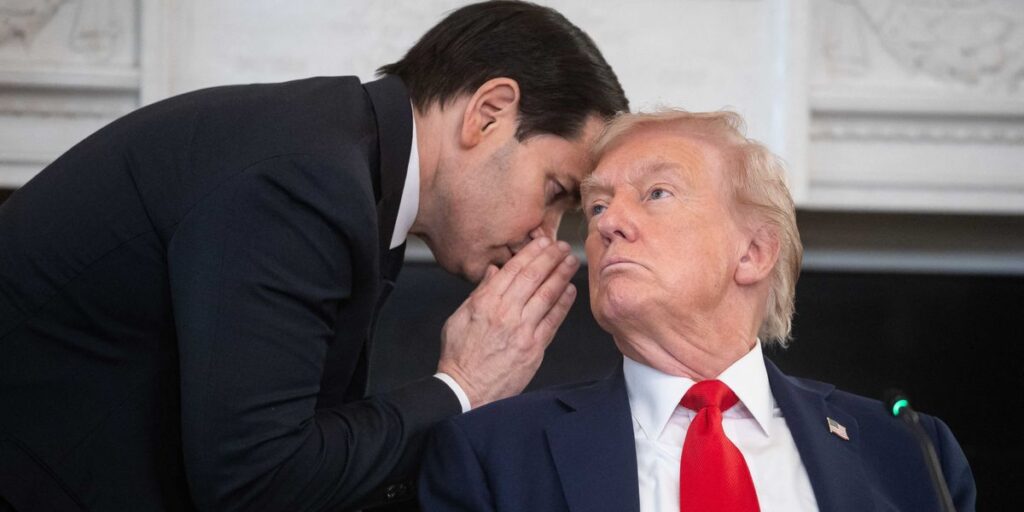
Colombian President Gustavo Petro publicly stated on Wednesday that a vessel carrying Colombian citizens was destroyed, resulting in fatalities. Two U.S. administration officials confirmed to the New York Times that Colombians were indeed on one of the boats targeted. In response, the White House dismissed Petro’s claims as “baseless” and “reprehensible.”
This incident underscores a broader narrative that has been building for years: former President Donald Trump’s enthusiasm for military solutions in the war on drugs. Former Secretary of Defense Mike Esper, in his memoirs, revealed that Trump had seriously considered missile strikes against suspected drug traffickers in Mexico, asking about the feasibility of such actions multiple times in 2020. Trump viewed these drastic measures as justified due to perceived failures by Mexican leaders to control their own country.
Trump’s Military Ambitions and the Shift to Venezuela
Trump’s advocacy for military action against drug cartels is not a new development. After a 2019 massacre of American Mormon ex-pats by cartel gunmen in Mexico, Trump tweeted about waging war on the drug cartels with Mexico’s cooperation. This rhetoric continued into his presidency, where he pressured then-Mexican President Enrique Pena Nieto to take stronger action against the cartels.
By 2023 and 2024, the idea of using U.S. military force against drug traffickers in Latin America gained traction among Republican leaders. Trump supported proposals for an Authorization for the Use of Military Force (AUMF) against the cartels, a stance shared by other prominent Republicans like former Attorney General William Barr and former U.N. Ambassador Nikki Haley.
However, Trump’s focus has shifted from Mexico to Venezuela. Despite his fiery campaign rhetoric, Trump appears content with Mexico’s current cooperation with U.S. anti-drug efforts. This shift in focus is partly due to a new agreement between U.S. Secretary of State Marco Rubio and Mexico’s President Claudia Scheinbaum to combat cartels while respecting national sovereignty. Meanwhile, the U.S. has agreed to curb the flow of guns into Mexico, easing diplomatic tensions.
Venezuela in the Crosshairs
Venezuela, however, remains a target for Trump’s administration. Leaders have equated suspected traffickers with terrorists, denying them due process protections. This approach builds on precedents set by previous administrations, where accusations of terrorist activity were often treated as definitive evidence.
There are increasing indications that Trump may use the war on drugs and terror as a pretext to overthrow Venezuela’s autocratic leader, Nicolas Maduro. The regime has long been a thorn in the side of U.S. conservatives, and even moderate liberals are critical of Maduro’s corrupt, authoritarian rule.
The U.S. has reportedly deployed a naval task force to the Caribbean, including 4,500 Marines and sailors, several destroyers, an attack submarine, and 10 F-35 stealth fighters.
This military buildup near Venezuela’s shores signals a potential shift towards regime change under the guise of an anti-drug offensive. Such a move could be disastrous, echoing past U.S. interventions in Afghanistan and Iraq.
Implications of a Potential Intervention
Trump’s “America First” foreign policy has often been more rhetoric than reality, as evidenced by continued U.S. involvement in Ukraine. However, Trump has consistently opposed regime change wars and nation-building missions, making a military intervention in Venezuela a complex proposition.
An effort to oust Maduro might succeed, given Venezuela’s dire economic situation and the exodus of millions of citizens. Maduro’s regime survives through rigged elections and partisan militias, but defeating these forces could be challenging. Even limited military actions, like seizing ports, could result in significant bloodshed.
The term “War on Drugs,” coined by Richard Nixon, was intended as a metaphor. Trump’s literal interpretation of this term poses significant risks for the United States.
Historical Context and Future Outlook
Comparisons to past U.S. foreign policy blunders highlight the potential pitfalls of a military intervention in Venezuela. The U.S. has a history of regime change efforts that have led to prolonged conflicts and instability, as seen in Iraq and Afghanistan.
Trump’s focus on Venezuela may also be influenced by domestic political considerations. His base, characterized by an “America First” mindset, is increasingly skeptical of foreign interventions that do not directly benefit the U.S. This skepticism is compounded by the financial and political costs of supporting allies like Israel, which have strained U.S. resources and political capital.
Ultimately, Trump’s ambitions in Venezuela could redefine his legacy. A successful intervention might bolster his standing among supporters, while a failure could lead to further criticism of his foreign policy approach. As the situation develops, the world watches to see if the U.S. will pursue a diplomatic solution or risk another costly military engagement.






